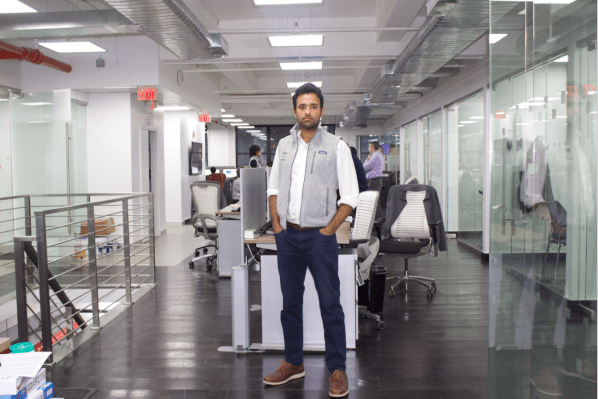Last month, SoftBank, through its massive Vision Fund, led the single biggest private financing round for a healthcare company ever — funneling $1.1 billion into the drug holding outfit Roivant Sciences.
Today, the Japanese conglomerate might be regretting that decision. The reason: despite hundreds of millions of dollars poured into one of Roivant’s publicly traded subsidiaries — Axovant Sciences — the company just received news that its much-hyped, experimental Alzheimer’s drug, intepirdine, doesn’t work.
It’s a devastating outcome for Axovant, which was taken public in 2015 in what was then the biggest biotech IPO ever in the U.S., and whose shares have plummeted nearly 75 percent today on the news.
The outcome is also a black mark against Roivant, which focuses on developing and commercializing a wide range of therapies and has numerous other subsidiaries, all of which involve the word “vant.”
In addition to Axovant, which is focused on neurology, Roivant has spun out Myovant Sciences, which is focused on women’s health and endocrine diseases; Dermavant Sciences, which is focused on dermatology; Enzyvant Sciences, which is focused on rare diseases; Urovant Sciences, focused on urology; and, most newly, Datavant, an AI-driven initiative that’s aiming to improve the design of clinical trials.
SoftBank’s investment is in Roivant only — not its subsidiaries. Founders Fund had also participated in that $1.1 billion round.
Roivant still has plenty up its sleeve, notes founder and CEO Vivek Ramaswamy, a biology major at Harvard who worked a hedge fund analyst while earning a law degree from Yale — a job that served as the inspiration for Roivant.
To wit, Ramaswamy has said he noticed pharmaceutical firms abandoning promising drugs for various reasons having nothing to do with their efficacy. Seeing an opportunity to complete the development of some of these overlooked drug candidates and get them to market quickly, and backed by the hedge fund where he’d been working, he struck out on his own in 2014.
One of his first moves was to acquire an Alzheimer’s pill from GlaxoSmithKline as it was dialing down its neuroscience research, forming Axovant around it and naming it intepirdine. Based on promising early results, Roivant took the company public. With those tests ongoing, Roivant also took public Myovant Sciences. It, too, was the biggest biotech IPO of the year. The drug candidate around which Myovant is centered is called relugolix; it aims to treat endometriosis and uterine fibroids and reportedly aced a mid-stage trial that ended in the spring.
Altogether, says Ramaswamy, Roivant’s companies are working on 16 different drug candidates in varying stages of development. That includes Axovant, which apart from intepirdine has a drug in Phase II trials right now for a progressive brain disorder called Lewy body dementia. Actor Robin Williams struggled with the disease, which impacts roughly 1.3 million Americans. (By way of comparison, an estimated 5.5 million Americans of all ages have Alzheimer’s disease.)
Ramaswamy has always acknowledged that the odds of coming up with an Alzheimer’s cure remain dauntingly low. At a small event hosted by this editor back in February, he described it as among the “riskiest areas of drug development,” but said it was worth the gamble, calling Alzheimer’s “probably the single greatest health threat to the economic security of our country over the next 40 years.” Left unchecked, he’d continued, “It’s probably the one disease area that we can definitely say has the potential to bankrupt our system.”
Today, Ramaswamy called Axovant’s results “disappointing for our company but also for a therapeutics area that really needed a win. We were hopeful we could take a shot at bucking that trend and I’m sorry for the millions of people and their caregivers who need new options. I’m sorry we couldn’t deliver that.”
He observed that David Hung, whom Ramaswamy recruited to lead Axovant, joined the company as CEO from Medivation, a biopharmaceutical company that saw its own hopes to cure Alzheimer’s dashed in 2010 when a drug it had concocted failed in its first late-stage clinical trial.
It’s worth noting that with its back against the wall, Medivation went on to create a blockbuster prostate cancer drug, and last year, Pfizer acquired the company for $14 billion.
The same could prove true for Roivant, but the company has a much taller wall to climb now, particularly given its splashy debut and the attention paid to Axovant in particular as its first spin-out. As Harvard business professor and Axovant board member Gary Pisano told the outlet STAT last year, “In biotech, your first impression is your first drug.”
SoftBank declined comment for this story, though a person familiar with the team’s thinking says that SoftBank’s interest in Roivant was never “premised on Axovant’s success” and that it is instead a “broader and longer-term thesis” based on Roivant’s ability to leverage data sets and artificial intelligence to ultimately create FDA-approved drugs.
Certainly, Softbank’s team couldn’t have anticipated today’s outcome when it invested in Roivant last month. Trials are completely “blinded” until they are ended.
In fact, as some readers might recall, billionaire hedge fund manager Steve Cohen bet a quarter of a billion dollars on what seemed like another promising Alzheimer’s drug in 2008 and was charged with insider trading when it was learned that one of his portfolio managers was secretly obtaining details about the progress of its clinical trials.
Cohen’s hedge fund had dumped all of its shares by the time the disappointing results were made public. He later paid out a $1.8 billion fine to the SEC to settle the case.
